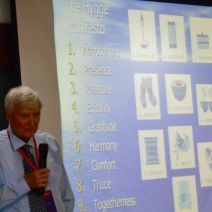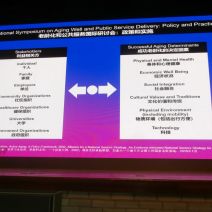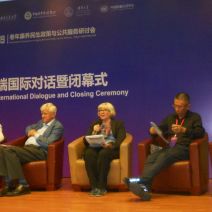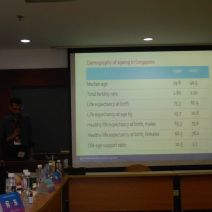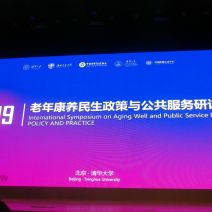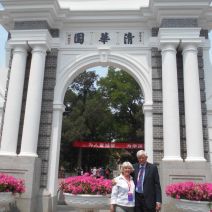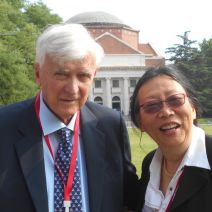Report on the International Symposium On Ageing Well and Public Service Delivery: Policy & Practice 15-16 June 2019 Beijing, China
Convened by Tsinghua University (Beijing) and a consortium of partners in other Universities, Ageing Centres, Associations and Public Organisations, the Ageing Well theme focussed on:
- Building a health care policy system,
- Cultivating professional personnel talents, and
- Developing high quality health care services.
The urgency was stressed, i.e. to ensure healthy environments for ageing and to optimise public service delivery.
 Participants in the International Symposium on Ageing Well and Public Service Delivery: Policy and Practice - Tsinghua University, Beijing
Participants in the International Symposium on Ageing Well and Public Service Delivery: Policy and Practice - Tsinghua University, Beijing
Background
Tsinghua University is a member of the C9 League of elite Chinese universities and a Class A institution. With the motto of “Self Discipline and Social Commitment”, the university is consistently placed among the “most reputable” universities of China and highly positioned in world rankings.
Professor Lan, Director – Urban Governance Research Center and Professor of Organisational Learning, through the university’s School of Public Policy and Management organised the speakers, program, partners and post-graduate students to conduct this international symposium.
Concerns & Issues
Issues addressed in the opening keynote were to improve methods (i.e. products and services), improve structures (esp. in rural areas, for the ill and disabled) and create smart platforms (e.g. for appropriate healthcare), as good channels of public service.
Various approaches and research from within China, Singapore, Netherlands, Japan, Australia, Switzerland and the USA (through a strong affiliation with the Arizona State University) expanded thinking on integrated policy and practice in aged care services. Modernising governance was a strong aim articulated at the symposium.
In striving to engage all stakeholders and achieve thorough integration, the interests of individuals, families, employers, community organisations and governments to related research from universities was recommended for continuing consideration.
Successful ageing determinants were identified as aspects of physical, economic and social wellbeing. And, the physical environments were explained in considering not simply new technologies enabling mobility and self-management, but also taking into account established cultural traditions. The “civil hat” was called for in macro/micro and societal level planning for a “silver worth” in putting people forward for the harmonious society sought.
While acknowledging the return of investment in the service industry for ageing was low, this emerging “sunrise industry” was viewed as a worldwide demographic phenomenon of increasing proportion. Thus, national old age care plans with institutional reforms are required now to cope with market requirements strengthening demand. Overlapping concerns from agencies overseeing population, industry, civil affairs, city administration, appraisal, learning, health and certification were highlighted.
Promotion of Prevention
The concept of a “golden age” has prompted researchers and policy makers to seek ways to prevent, reduce and control decline and disease. Postponing onset or development of the increases projected for illnesses such as diabetes to cardio-vascular issues were foreseen as ways to improve quality of life (especially for those aged 84+).
Resources allocation and institutional research that can serve and advise hospitals to build a stock of talent for work in the care industry, was proposed as a critical element of any policy reform. Standards that improve professional and social security quality, adequate input and reach were foreseen as a fundamental human issue that is currently lagging.
The “We Doctor” IT platform has started with individual registrations. However, back-up government policy that recognises the value of promoting this form of virtual hospital is needed to encourage direct access to data online, e.g. with the introduction of the 5G cellular network.
Panels
A number of parallel multi-speaker panels explored areas such as these below on the first day:
- Researching Public Service pension modes for “community of the future”
- Ensuring information technology supports a “smart retirement”
- Patterning the “wisdom of management” to improve home care services
- Achieving “person-centred care” and “ageing in place”
- Assisting “active ageing and lifelong learning” in the internet age
- Reducing the “dependency ratio”
- Adjusting policy mechanisms with a “multi-disciplinary approach”
- Accelerating the “learning society construction” as a foundation for elder health
- Integrating the “informal workforce” with the formal
- Transitioning and maintaining “dignity and self-support”
- Considering ways to “learning and happiness” in communities
- Realising successful ageing through “city for all ages”
- Incentivising “continuing employment” for a competitive economy
- Managing “cognitive disorders”.
The further presentations were not translated into English, but the overall topic of “Organisational Learning, Community Governance and the Grassroots” had speakers representing:
- Municipal vocational and adult education
- Urban studies learning
- Learning city research
- Community colleges
- Sustainability research
- Community-led initiatives
- Index on Healthy Ageing.
The focus on health issues primarily looked at practice mechanisms for health care, quality of life, also addressing issues for the poor, from the medical and legal perspectives on:
- Hospice living
- Disability high quality care
- International experiences in community health care
- Dementia care.
Standards & Certification
While not engaged in all parallel panels, we noted that this area warranted attention as commentators reviewed the personnel and institutional professionalism in the field. Agency actors were:
- Humanities and Social Sciences at the Ministry of Research and Business University
- Institute of Human Resources and Social Security Bureau and Beijing Municipal Science
- International Academy of Ageing (Liberal Arts)
- Chinese Academy of Personnel Science Laboratory
- Schools of Political Science and Public Administration
- Service for the Management of the Aged
- Personnel Training Systems (Urban Economics and Public Administration).
Moderating Ageing Services and Community Development
The following visionary aspects were introduced as part of understanding and action with reform initiatives:
- New era for age-old service systems of social organisation
- Evaluation of community governance through IT
- Embedding community aged care and rehabilitation
- Mental health differences and class within the elderly cohort.
Regional Health Care Service Coordination
Observations and analysis of both case studies and from other countries informed this panel on the second day of the symposium to illustrate systems, policy and practice, viz:
- Integrating aged services in the Yangtze river delta
- Exploring community health management and training in Guandong, Hong Kong, Macao and Dawan Districts
- Learning from the Netherlands pension system
- Developing strategies from Germany for pension policies and standards of service
- Comparing networking management, modes of pension and co-creation of value mechanisms from Beijing-Tianjin-Hebei systems.
A University Response in Real Time
A model for “retirement with purpose and meaning” at the Arizona State University in Phoenix (the largest public university in the USA and an established city destination for retirement) is being realised in the building of Mirabella. This complex provides a community in which residents:
- Interact with faculty and students
- Can take part in university activities (e.g. concerts to computer engineering)
- Advise students (e.g. on business start-ups)
- Provide a “living laboratory” for health care and research
- Continue with intergenerational exchange (e.g. through dining together).
Students who engage with these seniors can live free in the complex as they provide stimulus and support. In being committed to social responsibility, the University ascribes to mutual benefit in that for retirees their active social life promotes better memory and that this initiative is a revenue-raiser, thus enabling the funding of further research.
Challenges & Opportunities, Concepts & Experience
Part of the concluding dialogue was offered by international guests and the International Institute of Ageing locally. Speakers represented the following:
- Centre for Socio-Eco-Nomic Development (President), Switzerland
- Health Care Management Academy (Professor, School of Social Science), Singapore
- PASCAL International Observatory (Board Member), Australia
- School of Social Science (Associate Professor – Sociology & Gerontology), Singapore
- PASCAL International Observatory (Associate), Australia
- Centre of Excellence in Population Ageing Research (Research Fellow – ARC), Australia
- National Interdisciplinary Institute on Ageing (Executive Manager), China
Three dimensions: health, active life and motivation, were recommended by the compere to help change attitudes towards success for local government in planning and redesigning policy and practice. He also envisioned lifelong learning being tied to such priorities (with concern for what was termed major interest by seniors in “entertainment” learning).
Conceptually, the speakers in this final panel (referred to as “high end” discussants), focussed on:
- inclusiveness; community coherence;
- ageing in place; equity; cognitive training;
- balance between theory/research/practice;
- shifting mentality from ageing as a risk;
- overcoming ageism; social human responsibility; social determinants of health;
- improving capability for happiness;
- diverse needs across and within the ageing demographic to be catered to;
- WHO Age-friendly practices to be adopted across Ministries;
- compensating the elderly;
- PPPP (Public; Philanthropic; Public Partnerships);
- delivery synergies and integration;
- variety of services encountered;
- inadequate purchasing power of the aged;
- wider benefits of learning;
- implementing neuroscience breakthroughs;
- work/life balance for informal carers;
- meaning in living together;
- looming impact of 4th industrial revolution;
- foster learning interest in pleasure/leisure/purpose/relevance;
- acknowledge changes to filial piety;
- bridge enterprise and government initiatives;
- people-centred nursing homes.
- objectively assign insurances;
- do not only focus on basic needs alone.
In remarks by the symposium organiser, Professor Lan, he addressed the humanity required in boundary spanning for better social governance. The huge potential in aged care for the future was also tempered by ensuring synergies towards ageing well. Innovation was seen in creating an autonomous health ecosystem with continuous learning.
Concluding Comments
A very intense experience with wide ranging topics coming from ageing bodies primarily concerned with health, public administration and the law in developing new policies to govern modern responses to this growing issue. The factor of integrating holistic learning to the model was not clearly identified for acceptance, although some speakers elucidated this need. The field trips complemented discussions, especially a Senior Care Community Center which ran an Active Ageing and Smart Service Technology program for registrants to monitor and record health rates on blood pressure, oxygen, strength, etc. Commendations to all engaged in embracing the various and allied perspectives. This demonstrated thorough considerations from all players in addressing the current and emergent solutions required to provide for the increasing ageing demographic.
Photos Follow
Gallery pictures [left to right]: Peter Kearns OAM FACE - Danish quotients; Ass. Pro. Prem Dommaraju – Singapore ageing data; Dr Takako Tanemoto – Japanese Dementia Care; Stakeholders & Successful Ageing Determinants; Professor Lan – Chinese organisational learning; High-end International Dialogue Panel; PASCAL Board Member, Peter Kearns with Dr Lichia Saner-Yiu, Centre for Socio-Eco-Nomic Development, Switzerland; High-end International Dialogue Members: Dr Lichia Saner-Yiu, Peter Kearns OAM FACE, and Dr Denise Reghenzani-Kearns.
- PASCAL Activities:
- PASCAL Themes:
- LCN Network:
 Printer-friendly version
Printer-friendly version- Login to post comments

